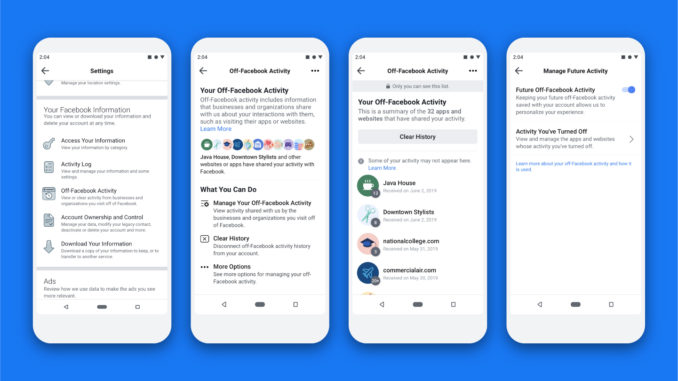
Nope, it’s not a new fringe of a major festival. Instead, it’s new functionality from the world’s most-used social network created in response to its data-damaged reputation. So what do digital marketing experts need to know about Off-Facebook?
What is Off-Facebook?
Off-Facebook is the option for users of the network to access a list of all platforms, websites and more sending data about them to Facebook.
Once the list is visible they can tap on a specific app or website and see exactly what’s being shared. If someone isn’t happy it’s their prerogative to block data sharing, or block all services in one fell swoop.
So it’s a data clean-up?
Not quite. In reality what Off_Facebook does is remove the link between any data that has been collected and a user’s personal information stored on Facebook.
Those who implement this option will find they are automatically logged-out of any website or app they usually use Facebook to log in with.
What does Off-Facebook mean for digital marketing experts?
Now, the important bit. Off-Facebook could have potentially quite significant implications for brands and digital marketing experts. These include:
*Higher bounce rates for websites and less app activity
If users are forced to sign in every time they access a third party platform there’s more chance they will be put off completing that request. This is based on the theory that we need to reduce the number of clicks to attract an audience.
*Less data, fewer insights, smaller audiences and reduced recipients
If people are opting out with greater ease this could well impact on how much data, sign-ups, monthly visitors and users marketers can attract.
Facebook has already caused controversy for its Instant Articles. This format keeps users within the app or domain even when reading complete articles from third parties. Referrals from Facebook have already been in decline as a result, and this next step could continue that downward trend.
Why is Off-Facebook even a thing?
It’s news to nobody that Facebook has been stuck in brand crisis territory since the Cambridge Analytica scandal. Trust in the network is at an all-time low, despite ongoing statements trying to convince everyone the platform respects their privacy.
This makes Off-Facebook a logical step. As Jasmine Enberg, social media analyst at eMarketer, told PR Week:
“It takes a proactive step for consumers to go into their Facebook settings and turn on the feature. As we’ve seen in the past, there is a disconnect between people who say they care about privacy and those who actually do something about it.”
Is there any way it might benefit digital marketing experts?
Yes, in a nutshell. People are growing increasingly hostile towards Facebook and other social networks due to trust and privacy. In turn this means they are sharing less about themselves.
What they do share provides vital information about account holders both brands and the network rely on. So anything that could reverse the trend of distrust could have a positive impact.
Looking for more advice from digital marketing experts?
Get in touch today.
The post What digital marketing experts think of Off-Facebook appeared first on Smoking Gun PR.

